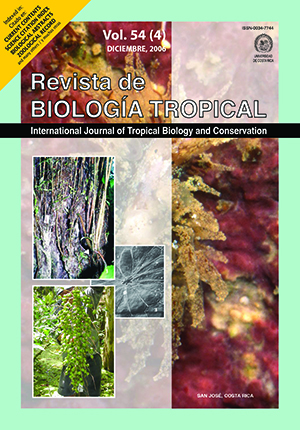Resumen
Astrocaryum jauari Mart. (Arecaceae) is one of the commonest palm species occurring in nutritionally poor Amazonian black water floodplains. It is an emergent or subcanopy tree that grows on river banks and islands, with a wide distribution along the entire flooding gradient, tolerating flood durations between 30 and 340 days. The species is important for fish nutrition in the floodplains, and is also used for hearts of palm. In the present study, the auto-ecology of A. jauari was analysed over a period of two years in the Anavilhanas Archipelago, Rio Negro, Brazil, with a focus on phenology, fruit production, and seed dispersal. Fruit fall is annual and synchronized with high water levels, with a production of 1.6 ton of fruit ha-1. The fruits are eaten by at least 16 species of fish which either gnaw the pulp, fragment the seed, or ingest the entire fruit, thus acting as dispersal agents. Besides ichthyocory, barochory (with subsequent vegetative propagation) is an important dispersal mode, enhancing the occurrence of large masses of individuals in the Anavilhanas islands and in the region of maximum palm heart extraction near Barcelos.Comentarios

Esta obra está bajo una licencia internacional Creative Commons Atribución 4.0.
Derechos de autor 2006 Revista de Biología Tropical
Descargas
Los datos de descargas todavía no están disponibles.






